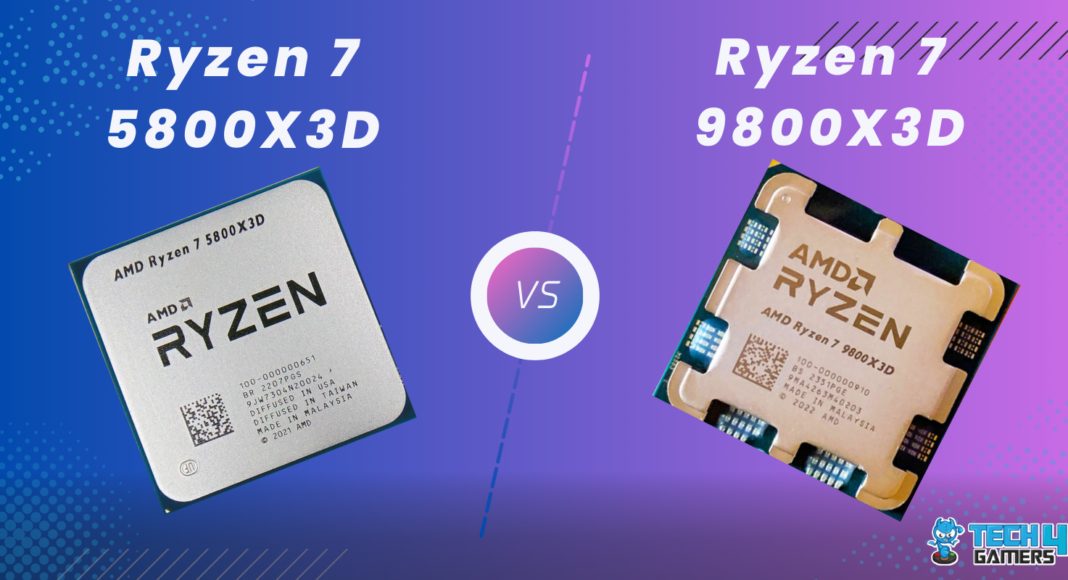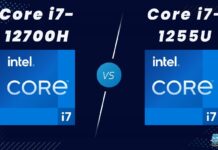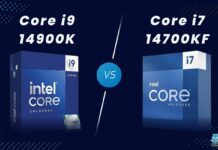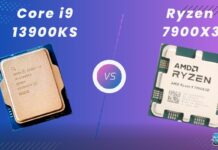AMD Ryzen 7 9800X3D Rated: 9/10 AMD Ryzen 7 5800X3D Rated: 8.8/10
Pros And Cons
| CPU | Pros | Cons |
|---|---|---|
| Ryzen 7 9800X3D | ✅ 16% higher Turbo Boost frequency ✅ Includes an integrated GPU | ❌ Much more expensive |
| Ryzen 7 5800X3D | ✅ Lower power consumption ✅ Lower price tag | ❌ No integrated GPU ❌ Slightly worse in terms of performance |
Comparison Table
| Feature | Ryzen 7 9800X3D | Ryzen 7 5800X3D |
|---|---|---|
| Instruction Set | x86-64 | x86-64 |
| Codename | Zen 5 (Granite Ridge) | Zen 3 (Vermeer) |
| Integrated GPU | Radeon Graphics | No |
| Fabrication Process | 4 nm | 7 nm |
| Socket | AM5 | AM4 |
| Memory Size | 192 GB | 128 GB |
| Best Motherboards | Best Motherboard For Ryzen 7 9800X3D | Best Motherboards for Ryzen 7 5800X3D |
| Best CPU Coolers | Best CPU Cooler For Ryzen 7 9800X3D | Best CPU Coolers For Ryzen 7 5800X3D |
| Best RAM | Best RAM For Ryzen 7 9800X3D | Best RAM For Ryzen 7 5800X3D |
| Processor Review | AMD Ryzen 7 9800X3D Review | - |
Architectural Differences
- Core Count: The Ryzen 7 9800X3D and Ryzen 7 5800X3D feature 8 cores and 16 threads, which is lower than the higher core count of flagship models.
- Clock Speed: The 5800X3D has a base clock of 3.4 GHz and can boost up to 4.5 GHz, which is lower than the 9800X3D’s base clock of 4.7 GHz and boost up to 5.2 GHz.
- L3 Cache: The 5800X3D has an impressive 96 MB of L3 cache, designed to accelerate gaming performance, while the 9800X3D matches this with 96 MB as well.
- Process Node: While the 5800X3D is built on a 7nm manufacturing process, the 9800X3D has moved to a more advanced 4nm node.
- TDP: The 5800X3D has a TDP of 105 watts, whereas the 9800X3D’s slightly higher 120-watt TDP reflects its more advanced architecture and clock speeds.
I am usually against hyping up processors, especially given the current market state, but the X3D chips are exceptional. The recent 9800X3D consistently beats the competition in all of our comparisons. Let’s compare the Ryzen 7 9800X3D vs Ryzen 7 5800X3D to see how this line has evolved.
Gaming Benchmarks – 1080p
Now that we have gone over all the aspects of both the new and the old processors let us see how they compare when we play some games on them. All the testing will be done using a measured test bench, the specifications of which are mentioned below:
Test Bench
- OS – Windows 11
- RAM 1 – G.Skill Trident Z5 RGB 32GB DDR5-6600
- RAM 2 – Patriot Viper LED DDR4-3600 16GB RAM
- CPU Cooler: Noctua NH-U12S SE-AM4
- Graphics Card – GIGABYTE RTX 4090 Gaming OC 24G
- SSD – CORSAIR MP700 PRO 2TB
- Power Supply – be quiet! Dark Power Pro 13 1300W
Star Wars Jedi: Survivor

- In the first game of our testing, the Ryzen 7 9800X3D averaged 234 FPS, which is a 44.44% improvement over the relatively low 162 FPS of the Ryzen 7 5800X3D.
- In 1% lows, the Ryzen 7 9800X3D reaches 206 FPS, outperforming the 5800X3D’s 141 FPS by 46.1%. This difference was very noticeable when we were playing these games on a high refresh rate monitor.
The Last Of Us Part 1

- The Ryzen 7 9800X3D delivered an impressive average of 208 FPS, a substantial 31.65% increase compared to the 5800X3D’s much less impressive 158 FPS.
- Coming to the lows, the 9800X3D achieved 155 FPS in The Last Of Us Part 1, which is 42.2% higher than the 5800X3D’s plateau of only 109 FPS.
Cyberpunk 2077: Phantom Liberty

- With an average of 219 FPS, the Ryzen 7 9800X3D is 33.54% ahead of the 164 FPS offered by the Ryzen 7 5800X3D in our test of Cyberpunk 2077.
- In terms of 1% lows, the 9800X3D delivered 148 FPS, surpassing the 5800X3D’s 117 FPS by 26.5%, which was a less impressive difference than we saw in previous games.
Hogwarts Legacy

- In our test of Hogwarts Legacy, the Ryzen 7 9800X3D averaged 170 FPS, which was a 54.55% improvement over the 5800X3D’s noticeably lower 110 FPS.
- For 1% lows, the 9800X3D provided a minimum framerate of 111 FPS, which was 63.24% higher than the 5800X3D’s concerningly low minimum of only 68 FPS.
Remnant II

- The 9800X3D recorded an average framerate of 158 FPS when we tested Remnant II on it, while the 5800X3D had an average of 108 FPS, making the delta grow to 46.30%.
- The 1% lows of the 9800X3D were at 122 FPS, which represented a difference of 34.07% against the 5800X3D’s more modest 91 FPS lows.
Homeworld 3

- Homeworld 3 ran excellently on the 9800X3D, with an average framerate of 136 FPS, around 51.11% higher than the 90 FPS our Ryzen 7 5800X3D system could provide.
- Coming to the lows, the newer processor reached a minimum of 63 FPS, which was 34.04% better than the sub-sixty 47 FPS that the 5800X3D got.
A Plague Tale: Requiem

- We recorded a 35.42% difference in our test of A Plague Tale, with the 5800X3D getting an average of 144 FPS, while the 9800X3D had an average closer to 195 FPS.
- The lows were around 132 FPS on the 9800X3D, adding up to a 24.53% improvement over the 5800X3D’s 106 FPS.
Starfield

- Finally, the last game of our testing performed 50.54% better on the 9800X3D at 140 FPS, while the 5800X3D hovered closer to an average of 93 FPS.
- The lows were also much higher on the newer chip at around 115 FPS, whereas Starfield ran with 1% lows of only 70 FPS on the 5800X3D, creating a 64.29% divide between the two.
Productivity Benchmarks
Now that we’ve seen what these chips can do in terms of gaming performance let us take a look at how they perform in terms of performance metrics. For this section, we have used the same test bench as the one mentioned in the gaming section.
Cinebench R24

- In the multi-core test, the Ryzen 7 9800X3D had an impressive score of 1388 points, which was around 62% higher than the 858 points achieved by the 5800X3D.
- The single-core score was a bit closer, with the 9800X3D getting 135 points, while the Ryzen 7 5800X3D got a score of around 96 points, which was a difference that came out to around 40%.
7-Zip

- The compression test ran with a score of 138 points on the 9800X3D, which was around 55% higher than the 89 points of the Ryzen 7 5800X3D, a remarkable difference.
- The decompression test saw a 25% improvement with the newer processor, with a score of 146 points, whereas the Ryzen 7 5800X3D had a score of 116 points.
Blender

- Finally, the last test we did was the Blender Open Data test, in which the newer processor scored 152 samples per minute, whereas the 5800X3D scored only 97 samples per minute.
- This worked out to a difference of about 56%, which means the 9800X3D was quite a bit better than the 9800X3D in this benchmark.
Overall Performance
Average Framerate
Between the Ryzen 7 5800X3D and the Ryzen 7 9800X3D, we measured a difference of around 42% in the games that we tested in terms of average framerates. Though the averages were high with both processors, the 9800X3D was in a league of its own.
1% Lows
The difference between the two chips in 1% lows in our testing was around 40.5%, which was very noticeable in some games. Homeworld 3, for example, ran at a sub-sixty minimum framerate on the Zen 3 chip, whereas the Zen 5 processor ran it at 63 FPS.
Productivity
Overall, productivity was pretty poor from the 5800X3D, which is to be expected with it being two years old at this point, and it was never great at productivity to begin with. The 9800X3D also is only decent at productivity for today’s standards, but it blows the 5800X3D out of the water.
Temperatures
| Game | Ryzen 7 9800X3D | Ryzen 7 5800X3D |
|---|---|---|
| Star Wars Jedi: Survivor | 62 | 71 |
| The Last Of Us Part 1 | 65 | 72 |
| Cyberpunk 2077: Phantom Liberty | 66 | 69 |
| Hogwarts Legacy | 61 | 73 |
| Remnant II | 68 | 77 |
| Homeworld 3 | 64 | 71 |
| A Plague Tale Requiem | 70 | 72 |
| Starfield | 66 | 70 |
| Average Temperatures | 65.25🌡️ | 71.875🌡️ |
| Winner: Ryzen 7 9800X3D | ||
In our testing of the games mentioned above, the Ryzen 7 5800X3D ran about 10% hotter than the 9800X3D. Neither processor was excessively hot in our testing, though the lower temperatures of the 9800X3D are nice to have in the long run.
Power Consumption
| Game | Ryzen 7 9800X3D | Ryzen 7 5800X3D |
|---|---|---|
| Star Wars Jedi: Survivor | 94 | 94 |
| The Last Of Us Part 1 | 99 | 90 |
| Cyberpunk 2077: Phantom Liberty | 92 | 91 |
| Hogwarts Legacy | 89 | 84 |
| Remnant II | 98 | 96 |
| Homeworld 3 | 101 | 99 |
| A Plague Tale Requiem | 104 | 86 |
| Starfield | 91 | 98 |
| Average Power Draw | 96⚡ | 92.25⚡ |
| Winner: Ryzen 7 5800X3D | ||
In games, both processors bring up similar numbers when it comes to power consumption. The Ryzen 7 5800X3D has a 4% lower power draw, but this difference is more than made up for by the 9800X3D excellent performance.
Price And Availability
| CPU | Ryzen 7 9800X3D | Ryzen 7 5800X3D | Price Difference |
|---|---|---|---|
| Launch MSRP | 💲479 | 💲449 | 6.68% |
| Current Price | 💲479 | 💲209 | 129.19% |
According to our research about both these processors, the Ryzen 7 9800X3D is more than twice as expensive as the 5800X3D. After realizing this, the value proposition of the 5800X3D truly began to shine compared to the 9800X3D.
What We Recommend
Ryzen 7 9800X3D: As we have been saying, with all our comparisons featuring this processor, it is exceptional in terms of performance, power management, and even price concerning the other two attributes. The Ryzen 7 9800X3D is a truly great gaming processor.
Ryzen 7 5800X3D: This Zen 3 processor kicked everything off for the X3D line of chips, though its age shows in our testing. It had much lower performance in our testing, while the power consumption was essentially the game. However, the price is several tiers below the 9800X3D.
After all our comparisons with the 9800X3D, we can confidentially say this is the first subjective one. Either of these chips is great in its own price tier, and the decision of which to get largely relies on your budget.
The Ryzen 7 5800X3D was released in April 2022, over two years before the Ryzen 7 9800X3D. The Ryzen 7 5800X3D uses AMD’s long-lived AM4 platform. No, the Ryzen 7 5800X3D cannot be overclocked because of its 3D V-Cache architecture. Yes, you can overclock the 9800X3D out of the box, as AMD sends this chip out with an unlocked multiplier. If you want to play video games along with video editing, the 9800X3D will do you fine, but if you only want to edit videos, get a 9900X instead. FAQs
More From Ryzen 7 5800X3D More From Ryzen 7 9800X3D
Thank you! Please share your positive feedback. 🔋
How could we improve this post? Please Help us. 😔
[Comparisons Expert]
Abdemanaf is a skilled creative writer who has been honing his craft since 2011. While initially working in different fields, he found a passion for technology and has been exploring the tech world since early 2015. Over the years, he has developed an in-depth knowledge of the latest tech trends and product offerings by various companies.
Abdemanaf’s writing reflects his analytical mindset and ability to think critically. He has a knack for breaking down complex technical information into easily digestible pieces, making his articles engaging and accessible to readers from all backgrounds. In February 2022, he joined Tech4Gamers as a blog and product comparison writer, where he has been able to hone his skills further.
As a writer, Abdemanaf is dedicated to staying up-to-date with the latest technological advancements and trends, enabling him to provide readers with the most relevant and accurate information. He is always eager to learn more and is constantly seeking new challenges to improve his skills.
Get In Touch: manaf@tech4gamers.com





![RTX 3060 Ti Vs RTX 3070 [We Tested 8 Games]](https://tech4gamers.com/wp-content/uploads/2023/05/RTX-3060-Ti-Vs-RTX-3070.jpg)
![Radeon RX 7600 Vs RX 6700 [8 Games Tested]](https://tech4gamers.com/wp-content/uploads/2023/06/GPU-Comparison-Template-NEW-218x150.jpg)
